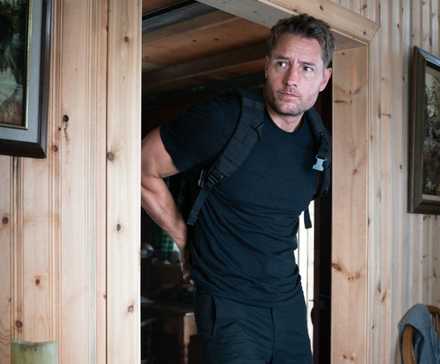
Burn Notice follows Michael Westen, a CIA operative who is cut off from the intelligence world without prior warning. Colter Shaw, as a tracker, can employ his skills, attention, and unfailing logic to achieve the objective he sets out to accomplish. Meanwhile, Michael Westen depends on disguise, surveillance, and fieldcraft. Though their means are different, their way of thinking is the same. In a way, both of them see danger as a list of steps rather than an emotional storm. Tracker and Burn Notice, through their existence as episodic adventure TV, prompt the resurgence of this kind of programming.
Burn Notice Delivers Case-of-the-Week Thrill
One of the main elements that connect Burn Notice and Tracker is their weekly case-based storylines. A client comes with a problem, the protagonist solves it, and the episode takes its course following a clear line of troubles and resolutions. The viewers are always kept in the loop about the story’s structure, and both series execute it with confidence.

In the latest episode of Justin Hartley’s hit show, Tracker, Melanie Day planted some seeds that could set up a future plot twist for Colter Shaw.
He collects evidence, listens to the person’s side of the story, and is an expert tracker without using spy gadgets or disguises. The same methodical feeling is there: every issue is seen as a puzzle that is being slowly completed. It is Shaw’s calm, reporting style that gives the show a consistent pace, keeping tension high and making its storytelling clear and focused from start to finish.
Moreover, both series reveal intimacy through the characters’ pasts in their main plots. Michael chases the person who “burned” him at the agency, while each weekly case is independent. Thus, people are allowed to see a story unfold without losing the thrill. On the other hand, Colter’s family background is the backbone of the storyline. Such a format gives the audience a break from the intense, serialized TV, which presents a new story each episode, part of a broader plot, and finishes in an hour.
Michael Westen and Colter Shaw Are Lone-Wolves
Michael uses his spy training to assess situations quickly and find the simplest path forward. He approaches danger with the professionalism of someone who has seen worse. His voiceovers break down spy techniques, how to slip through hostile areas, fake surveillance, or improvise tools, with relaxed, matter-of-fact clarity that invites the viewer into his thought process.

Tracker dealt with significant casting adjustments ahead of Season 3, but the numbers suggest that Colter Shaw’s command remains unchanged.
Colter offers a parallel perspective through tracking, probability, and human behavior. He explains how terrain reveals motion, how people react under pressure, and how to anticipate patterns others overlook. His delivery is calm and factual, treating danger as a puzzle rather than a crisis. That grounded mindset is a major part of the show’s appeal. Both characters share a strong independent streak.
Michael, cut off from his old life, relies on only a few trusted allies. Likewise, Colter was raised to depend on himself and works alone unless assistance is essential. Their independence gives them a quiet intensity that separates them from typical action leads.
Tracker and Burn Notice Prove the Adventure Procedural Is Thriving Again
Adventure procedural series have been quiet for the last decade, but they’re finally slipping back into the spotlight. After years of heavy, hyper-serialized dramas, audiences are craving something lighter, breezier, and far less time-devouring. Tracker is the clearest sign of this shift, and Burn Notice shows precisely how the formula works at its best.
Both series hinge on a simple engine: each episode presents a clear mission, pushes the hero through inventive complications, and lands on a satisfying resolution. This flexible setup lets writers drop their characters into wildly different situations without losing the clarity viewers love. Much of this resurgence comes from plain old “streaming fatigue.” People are tired of shows demanding full attention, endless lore, and emotional homework. Tracker and Burn Notice do the opposite.
In the latest episode of Tracker, Justin Hartley’s hit show continues to shake things up with a first for Colter Shaw.
They offer complete stories, steady pacing, and protagonists who walk you through their thinking. The experience becomes refreshing instead of exhausting. Another factor is the appeal of pure competence. There’s something deeply reassuring about watching experts solve problems with logic and calm.
Burn Notice Had Seven Seasons of Secrets, Growth, and Explosions
Seven seasons allow Burn Notice to mature from the basic narrative of a spy stripped of his badge into a full-scale character saga. Michael changes throughout the series. The burn notice, which was initially a mystery, becomes the main reason for changing his whole identity. He figures out the right moments to trust, to detach, and to let others see the inner side of his life that he had always kept for himself.
The bond between characters becomes strong as well. Fiona becomes gentle in ways that she herself does not anticipate. Sam discovers a life beyond drinking and having fun. Even Michael’s mother, Madeline, doesn’t stay the same as an overly worried chain smoker but becomes a calm support who amazes Michael just as much as she amazes the viewers.

Tracker’s New Velma Replacement Changes Justin Hartley’s Show in the Wrong Way
Tracker Season 3 ends an era, and as a result, some of its charm is missing, as it reshuffles its cast to replace Colter’s most formative teammates.
It is a series that invites marathon viewing as Burn Notice understands perfectly how to play the long game. The show responds in riddles; it builds, breaks, and constantly forces Michael to choose between revenge and redemption. For Tracker followers who adore long-form character development, the result is just impossible to resist.
Burn Notice and Tracker have clear goals, the characters make smart decisions, the pace is steady, and the heroes are in control. One is mainly about spycraft and using what you have in an unexpected way, while the other is more about the use of tracking skills and behavioral insight, but the underlying reasons for their popularity are the same. They both rely on the audience to take pleasure in a neat, well-planned problem-solving story and do it every week without any unnecessary complications.




